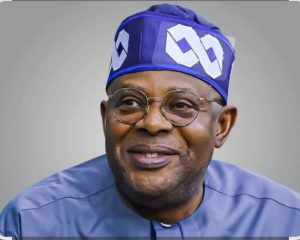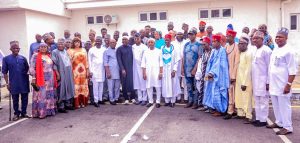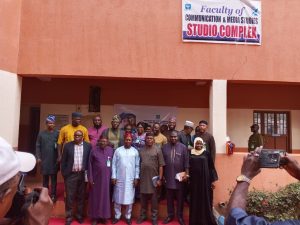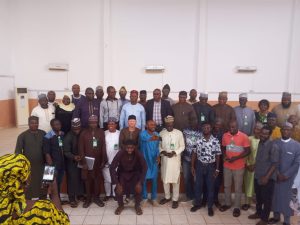Bello: Fostering Unity In Kogi Amidst Ethno-Religious Diversity
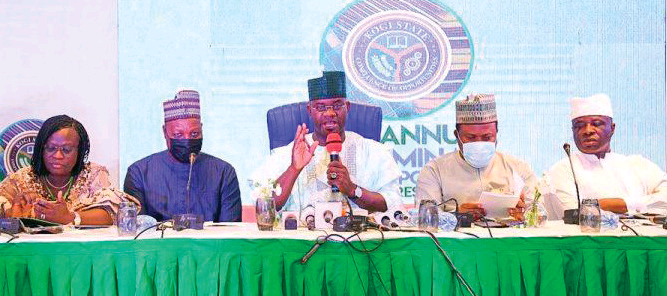
Just like Nigeria, the North- Central state of Kogi is one of the most ethnically and religiously diverse states in the country. WALE ELEGBEDE reports on how the Governor Yahaya Bello-led administration is making the state a true confluence of diversity through equal representation and good governance
Disunity, mistrust, domination, sentiment are some of the adjectives used to define Kogi State, prior to January 2016. The deep-seated ethnic and cultural differences in the state was freely used by some elites, especially politicians, to fan the ember of their sentiments and this ultimately led to needless ethnic rivalry among otherwise pleasant people.
Expectedly, the ethnic sentiments rained from the leaders to the masses. This, subsequently, dovetailed to the quality of governance and relations among the diverse people of the state over the period of time. It was simply at an all-time low.
But like the biblical never-saddled colt prepared for the Messiah’s triumphal entry into Jerusalem, an apostle of unity and equity came to the saddle of leadership in Kogi State some five years ago and the culture of nepotism along with its effects has gradually fizzled away.
For social scientists and analysts, Governor Yahaya Bello, the 46-yearold Chief Executive of the Confluence State, must have done something significant to achieve a peaceful, united and non-conflict Kogi State that is now being seen and admire by and all sundry.
Explaining the strategies and efforts that have brought about the current ethnic and religious cordiality among tribes and people in Kogi State to Nigeria’s Political/Crime Editors and Correspondents, recently, the Commissioner for Information in the state, Hon. Kingsley Fanwo, said Governor Bello is the symbol of unity that has stabilised the state and the people.
Fanwo presented a paper titled: ‘Peaceful co-existence in a multiethnic, multi-religious society: How Kogi’s three main ethnic groups became one’, at the Day Two of the first Annual GYB Seminar for Nigeria’s Political and Crime Correspondents held at the Transcorp Hilton, Abuja, last month.
The workshop, which was titled, ‘Reporting Nigeria for Nigeria’, was initiated by Governor Bello, was attended by the governor for the two days, his cabinet members, lawmakers, top government functionaries, resource persons, media executives from electronic, digital and print media across the country, including the Managing Director of New Telegraph Newspapers, Mr. Ayodele Aminu.
In its concept note, the organisers said the workshop is aimed at empowering the relevant sections of the local and international media with a deeper knowledge of the peculiarities of Nigeria as a nation, with a view to delivering authoritative reports on the political environment as well as crime without harming the essence of Nigeria’s unity. Elucidating on how Governor Bello birthed a culture of inclusion, unity and sense of belonging in Kogi State, Fanwo said his principal ensured that distribution of appointments and political patronage reflect the diversity of the state.
He said: “When you look at Kogi State, it is a microcosm of a larger Nigeria, a nation of ethnic nationalities. It is also a place where you have convergence of religions. “What was the situation before 2016? The state was balkanized along ethnic lines, we have the major ones, the Igala, Ebira, Okun, Bassa and other ethnic groups.
There was sharp division among these ethnic groups, mutual distrust, no sense of unity, among others.” Identifying the personalities and trends of division in the state, he said politicians are the major actors who set the deprived against one another so that they can continue to oppress, suppress and maginalise and steal from the people. His words: “Prior to 2016, all the elected governors from the state came from a particular senatorial district of the state. But the argument is that if you have been producing all the governors, we should be able to see the value but it was not there.
It shows that they were not doing it for the people of that senatorial district but they were only doing it for themselves.” Clearly, to change the narrative, unity was needed and the task of uniting the Confluence State appears onerous. Fanwo said: “A governor emerged in 2016 and said I don’t want to be a sectional governor but a governor for all. When he emerged, people were waiting to see whether he was a politician or a practical personality.
“He was sworn-in on the 27th of January, 2016 as the governor. Before he left the place, opinion molders and people who usually determine who gets what and how were already waiting at his residence to determine who will be his Chief of Staff, SAs, Chief Press Secretary, among others. “But on his way home from the inauguration ground, he sent the list of his Chief of Staff, SAs, Chief Press Secretary for announcement before he gets home. The CoS then was from Kogi East and that was the first time in the history of the state that an elected governor will have a CoS not coming from his own senatorial district.
“His then SA media was from Kogi Central, his CPS was from Kogi West. When the announcement was made, then the entire Kogites and Nigerians knew that there is a new Sheriff in town. You don’t just say it by mouth, you act it. As a leader, when you are a unifier, you don’t have to announce it, you practicalise it.
Indeed, Kogi is better now.” Drawing an instance from a state executive council meeting, he said the governor instructed that Commissioners should mix their sitting arrangement to reflect the state’s diversity. “I remember a memo was brought to the exco for the construction of a road in the Governor’s senatorial district.
But he looked at the well-crafted memo and said we are stepping it down and that the Commissioner for Works should look at it and add roads in the West and the East before the memo can be considered. “In his appointments and projects, the Governor has shown the exemplary performance of unity. He refused to play the game of the bandwagon of division. He remembered the forgotten regardless of their districts or tribe,” Fanwo said. The Information Commissioner stated that the capacity of the governor to unite the state is the reason why Kogi State is calm, adding that “this is why someone from Okenne can go to Idah and comfortably sit down. That is why someone from Agassa can go to Ankpa and point to a township road that cost almost a billion naira and say that your brother from Agassa did it for us. That is what we have in Kogi State today.
“The division is disappearing because someone is just, pragmatic, objective and building a Nigeria in Kogi State and that person is Governor Yahaya Bello.” Identifying disunity and distrust as the bane of the current insecurity in the country, he said many leaders are not helping matters with divisive statements that could aggravate the country’s problem. “But there is someone doing things differently in the face of diversity. Aside from ensuring security, he has fostered unity. That is why many people and groups are calling on him to take up the nation’s plum job. “Nigeria needs a unifier, who everyone can trust.
The Igbos, Hausas, Fulanis, Yorubas are listening to him. It is because he has demonstrated capacity that he has the bulwark of our national cohesion which is unity,” he explained. Also giving insight on how Governor Bello is fostering unity and peaceful co-existence through civil service reform, Secretary to the State Government, Dr. (Mrs.) Folashade Arike Ayoade, said the state government now ensures that Kogi’s distribution of permanent secretaries, reflects the diversity of the state.
Delivering a paper titled “Impact of Civil Service Reform on National Growth: Kogi as a Case Study,” she said on assumption of office, Governor Bello inherited a civil service that was divided and bedeviled with decayed infrastructure and poor morale of workers. In her exposition, she noted that the model adopted by Governor Bello in the Kogi State Civil Service reform can enhance national development if adopted. Highlighting some of the stand-out models employed by the administration, she said writing of examination for permanent secretaries, payment of salaries as and when due and improving infrastructure in the civil service, have helped in boosting the morale of the civil service. Commending Governor Bello for his good example in the civil service reform, the former Deputy Director with the National Agency for Food and Drug Administration and Control (NAFDAC), said the administration has laid the foundation for a skilled, competent and productive civil service in the future. Clearly, the several tribal groups in Kogi State like the Igalas, Ebira, Okun, Bassa, Ogori, Nupe, Oworo, Kakanda and several others, have not had it so good in terms of united identity and inclusiveness. The ethnic recognition and management of political diversity by Governor Bello that has made the state to be thriving since 2016 is a model that should be embraced and adopted at the national level.

